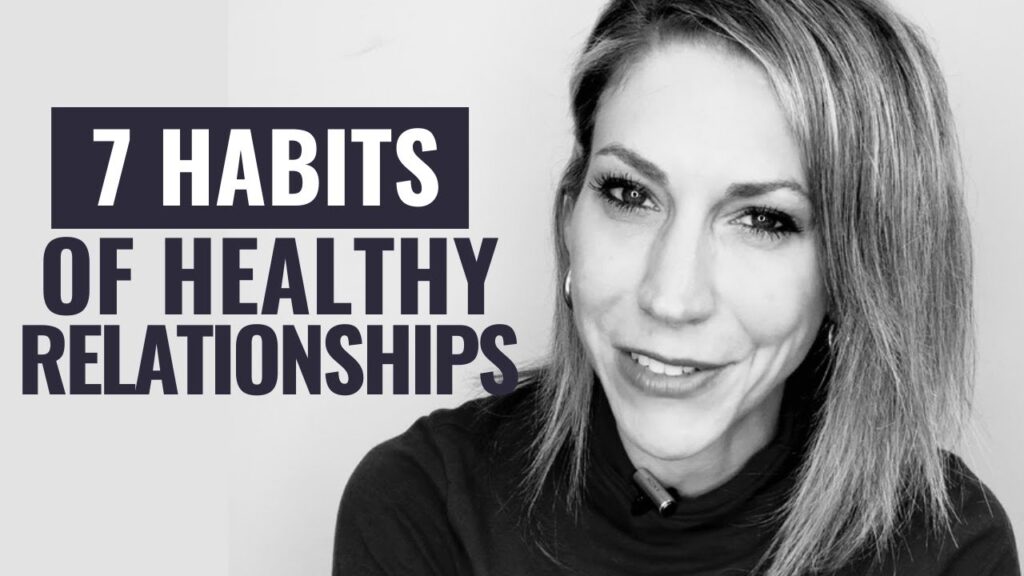
In a healthy relationship, both the partners share their thoughts and feelings. They also understand each other’s needs and work to meet them. This makes them happy and satisfied in their lives.
Healthy relationships are not just about loving someone; they are about building a life with them. The core of healthy relationships involves respect, trust, safety, acceptance, freedom of choice, positive communication and conflict management, and fun.
It is important to know the difference between healthy and unhealthy relationships to be able to keep yourself and your partner safe from harm. In this article, we will discuss some of the signs to look out for in a relationship.
1. Having a sense of responsibility
One of the chief characteristics of healthy relationships is having a sense of responsibility towards your loved ones and friends. This is especially important if you have kids and want to make sure they are happy, safe, and well-fed.
2. Listening without rebuttal and response
Another sound characteristic of healthy relationships is listening to your partner in a way that doesn’t interrupt them or make them think you are being critical. This way, you can communicate effectively and remove any misunderstandings that could be causing problems in your relationship.
3. Complimenting each other regularly
A healthy relationship encourages its significant others to do good things and achieve their goals. Whenever they get something right, their significant others are always there to give them encouraging compliments. This helps to build their confidence and make them feel special.
4. Being honest and truthful
The most important quality of a healthy relationship is being truthful with your partner. This is especially important if you are in a relationship where the other person may be your child or sibling. A person who is always lying to their partner can never have a healthy relationship with that person.
5. Be disciplined
It is common for people in healthy relationships to be disciplined when dealing with their partners. This is especially true when there is a lot of stress in the relationship.
This is because people in healthy relationships are able to maintain their boundaries and do not let them slip. They are also disciplined enough to not hurt their partners by being too emotional, or overly protective.
6. Being open and honest
The best part about a healthy relationship is that it doesn’t have to be perfect. Everyone is going to make mistakes. It is important to be able to talk about these mistakes with your partner and find a way to work through them together.
7. Avoiding anger and yelling
It is very easy to become angry when there are things in your life that are not going the way you wanted them to. When this happens, it is important to try and calm down before talking about the situation.
If you are in a relationship where your partner is constantly angry with you, then you are probably in an unhealthy relationship. This is because it is hard to express your emotions in a healthy way when you are angry.
Long distance relationships
Long distance relationships can be challenging, but they can also provide valuable insight and a deeper understanding of each other’s individual lives. They can also help you learn to manage time better, which can be especially helpful when you live in different parts of the country or world.
The most common challenges in long distance relationships relate to communication. Even though text messages, email, voice and video calls have become more popular, they are still not a substitute for face-to-face contact. The lack of physical intimacy and a lack of emotional connection often lead to miscommunications and misunderstood feelings.
One way to improve communication in a long distance relationship is to create an environment that encourages frequent interaction between the two of you. For example, share a letter journal that includes notes and pictures that both of you can send back and forth. This can be a fun way to make the experience feel more intimate and meaningful for both of you.
Another way to improve communication is by scheduling a regular time for phone or video calls each week. It is important to schedule the date at a time that works for both of you, so that it doesn’t feel like a chore or like you aren’t spending enough time together.
Having open and honest communication with your partner is critical to the success of your long distance relationship. This can include talking about how you are feeling and asking each other about any fears that you may be facing.
It can also be a good idea to have regular chats with a friend or therapist about your long distance relationship. This can help you get a fresh perspective on your situation and keep your relationship moving forward.
Some people may be afraid of losing the physical intimacy in a long distance relationship, so a plan to visit each other often can be helpful. You can do this by using an app that allows you to connect and share photos with your loved one, or arranging a face-to-face meeting in your area.
You can also try to talk about what you are doing and how you are feeling in other areas of your life. This can help you understand how your partner is feeling and how they are handling their own issues.
A lot of people in long distance relationships find it hard to accept that they will be separated for a while, which can cause them to feel depressed and anxious about their situation. They might even feel that they are losing a part of themselves, which can lead to feelings of emptiness.
If you are in a long distance relationship, it is important to remember that you are making the choice to be apart from your loved one for now and that there will come a time when you will see each other again. Focusing on the positives of your relationship will help you to cope with the challenge of being separated for a while.
Age gap relationships
Age gap relationships are a great way to find love, but they can also be difficult to navigate. There are many different factors that can impact your relationship if you have an age gap, and it’s important to address them head-on.
Common misconceptions about age gap relationships
One of the most common misconceptions about age gap relationships is that they are a sign of weakness. This is false. Ultimately, age gap relationships are no more or less likely to succeed than any other type of relationship, and they can be just as strong if the couple works hard to keep it going.
Relationships between older and younger people have been around for ages, but there are some common mistakes that can make it harder to stay in a long-term relationship with someone who is a few years older than you. Here are some tips to help you avoid these common mistakes so that you can have a successful and happy age gap relationship:
1. Know your partner’s goals in life
When dating an age gap partner, it’s important to be aware of their dreams and needs in life. This will help you to build a strong foundation for the future of your relationship.
2. Set a common goal for your life together
When you’re in an age gap relationship, it’s important to be clear about your shared priorities in life. This will ensure that the relationship will be a positive experience for both parties, and it will also make it easier to understand each other’s desires and concerns in life.
3. Identify your mutual interests
In an age gap relationship, it’s normal to have differences in interests and hobbies. This can cause some frustration, but it’s important to focus on what you both enjoy doing and leaning into these interests. This will allow you to learn about each other and develop a deeper understanding of each other’s personalities and values.
4. Avoid criticism by your friends and family
When dating an age gap partner, it’s critical to be aware of the negative reactions you may receive from your friends and family. These criticisms can sometimes be judgmental and unfair, so it’s important to be able to handle this and not let it affect the way you feel about your relationship with your partner.
5. Express your feelings and be affectionate
When a couple is in an age gap relationship, it’s crucial to show their other half how much they care about them. This will help to overcome any societal stigma that is present in the relationship. It’s also important to communicate how much you enjoy the other person and to let them know that they are loved by both sides of your family.
6. Use humor and deflection to avoid criticism
When couples are in an age gap relationship, they often use comedy and other forms of humour to deflect negative judgment and criticism. This can help them to get through the rocky moments and also help to ease the underlying discomfort of being in an age gap relationship.
Interracial relationships
Interracial relationships are a special type of love that comes with many challenges. They involve clashes of culture, different experiences of life and upbringings, and more. However, these differences can make for an interesting relationship.
One of the biggest challenges that interracial couples face is race-based discrimination and prejudice. This can come in the form of public harassment, hate-filled comments, and more. It’s important to be prepared for this so you can protect yourself and your partner in any situation.
Avoid stereotypes
Stereotypes are very common and can be very hurtful to people of color. For example, if someone says that you should never drink coffee because you’re African American, this is a pretty big red flag. You should genuinely get to know your partner before you make any assumptions about their race.
The same goes for stereotypes about their food and drink preferences. If you see that they love a certain restaurant, but you don’t like it, this is another red flag. It’s a great idea to have a conversation about this and make sure that they know that you don’t share their views on these things.
Compromise
In any relationship, it’s important to compromise and work together as a team. It’s especially necessary in interracial relationships because you have to work harder than you do in other types of relationships.
You may also have to compromise because your partner’s family doesn’t approve of you or your lifestyle choices. It’s important to have a serious talk about these issues and see how you can compromise for the sake of your relationship and your partner.
It’s also important to be flexible in your behavior, so you don’t let the expectations of others affect your relationship. You should always be open to trying new things and exploring new interests with your partner, so you can both grow as a couple.
Do not be afraid to be honest about your own experiences with racism and bias, as this can help you to better understand how your partner feels about it. This can also help you to support them in their struggles and be a better partner.
Keep the conversation going
If you’re not comfortable talking about race, it’s not a bad idea to seek some advice from a friend or a family member. They can provide you with tips on how to deal with this in a way that will be respectful and supportive of your partner’s needs.
Understanding their background
If your partner is a person of color, it’s likely that they have been subjected to discrimination or prejudice at some point in their lives. This can include racism, microaggressions, and other forms of oppression that are often not talked about in society. These can impact their everyday life and create problems for them in their relationship.
You need to be honest and open with your partner about their experiences so that you can both work through them together. This will help you both to feel supported and loved by each other.
Boundaries in relationships
Boundaries are important in any relationship, but it’s especially vital to set boundaries in a healthy way. Without them, we can become overwhelmed and frustrated with ourselves and others. In fact, research shows that relationships that have clear and well-defined boundaries experience greater satisfaction and happiness.
Relationships with strong boundaries are also healthier because they reduce conflict and misunderstandings, which can lead to emotional abuse or violence in the long run.
The first step in setting boundaries is to understand what you value and what you don’t. This may take some self-reflection, but it will make a huge difference in how you communicate your needs and limits to others.
Once you have a better understanding of your values, it’s easier to assert your boundaries with clarity and grace. It’s also helpful to write them down and refer back to them regularly.
When you’re in a relationship, it’s important to talk about boundaries and why you think they’re important. These conversations can help both partners understand their personal limits and build a stronger bond.
A healthy relationship can only happen when each partner feels listened to, respected, and fulfilled. This is impossible if one person tries to control the other’s behavior and does not respect their needs.
Sometimes, we feel like we must give too much or say yes to everything just to please our partner. This can be dangerous because it can encourage a scarcity mindset, which is unhealthy for our mental health and overall wellbeing.
Having the courage to stand up for your needs and limits is an important life skill that will help you in your career, your friendships, and your love life. It’s a skill that takes time to practice, but it will pay off in the long run.
It’s also a good idea to communicate your boundaries with other people in your life, including family members. Not everyone will be able to respect them all of the time, but those who truly care about you will do their best to uphold your wishes and honor your boundaries.
Once you’ve established your boundaries, it’s a good idea to check in with your partner from time to time. This will help you nip any concerns in the bud before they get out of hand and can be difficult to address on your own.
If you’re struggling with the process, consider seeking professional help. A counselor can guide you through the process and provide tools to strengthen your boundaries.
In addition, a counselor can help you deal with the emotions that often accompany boundary violations so that you can heal and move forward with your life. A counselor can also assist you if you have been the victim of sexual violence or physical assault, and can offer support when you’re having trouble talking about your feelings.
The key is to keep your boundaries in mind and establish them at the beginning of a new relationship, rather than later on, when habits are established and the relationship has grown stronger. By practicing and establishing healthy boundaries early on, you can avoid the frustration of trying to change someone else and end up making your relationship worse.




